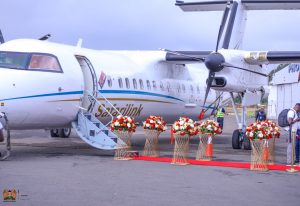Artificial Intelligence drives data-driven transformation in the global travel industry by revolutionizing customer experience, trip planning, and revenue models through 2030. As travelers demand faster, smarter, and more personalized services, AI is taking center stage—redefining how travel is searched, booked, and experienced. From intelligent chatbots and predictive pricing to real-time itinerary customization and operational automation, AI is injecting efficiency and innovation across every corner of the sector. Artificial Intelligence drives data-driven transformation in the global travel industry by improving not only how travelers engage with brands but also how those brands optimize performance, reduce costs, and increase loyalty. With the AI in Tourism market expected to grow from USD 2.95 billion in 2024 to USD 13.38 billion by 2030, the shift is both rapid and irreversible. This transformation promises a future where travel is more intuitive, intelligent, and aligned with the expectations of a hyper-connected, tech-savvy global audience.
Artificial Intelligence is transforming the travel industry with data-driven innovation and personalized solutions. In 2025, AI is no longer a futuristic add-on but a central force reshaping everything from trip planning to hotel management. AI-driven platforms, predictive algorithms, and intelligent automation tools are now essential components of modern travel ecosystems. As demand for efficiency, personalization, and instant service grows, AI is stepping in to redefine traveler experiences and optimize the operations of travel brands worldwide.
According to projections, the global AI in Tourism market will skyrocket from USD 2.95 billion in 2024 to USD 13.38 billion by 2030, showcasing an extraordinary CAGR of 28.7%. This seismic growth underscores AI’s critical role in powering the future of travel—an industry that thrives on smart recommendations, real-time data, and seamless user interactions.
The Global Travel Industry’s Growth Trajectory in 2025
The travel sector is on an upswing, poised for continued growth across all segments. Skift Research forecasts that every segment—airlines, cruises, OTAs, and accommodations—will post moderate to strong growth in 2025. Among the standouts are online travel platforms and cruise lines, leading the way in global recovery and innovation.
Meanwhile, the U.S. is expecting a 6.5% increase in international arrivals, reaching 77.1 million visitors in 2025, according to the National Travel and Tourism Office. This momentum reflects not only consumer confidence but the increasing integration of AI into the user journey, making travel decisions more informed, faster, and personalized.
AI’s Expanding Role in Travel Services
Artificial Intelligence is playing a pivotal role across multiple verticals within the travel industry. Let’s explore the areas where AI is delivering the most transformative results:
1. Personalized Travel Planning
AI algorithms are redefining how trips are planned. Through machine learning and behavioral analysis, AI platforms like Travel Genie are offering tailored travel recommendations, custom itineraries, dynamic pricing alerts, and real-time travel tips. These systems analyze user profiles, preferences, and past behavior to deliver hyper-personalized journeys that enhance satisfaction and build loyalty.
2. Operational Efficiency
Travel brands are using AI to streamline logistics, manage workforce scheduling, and maximize revenue. AI-enhanced revenue management systems help hotels and airlines adjust prices dynamically, often increasing revenue by up to 10%. Chatbots now handle over 80% of customer service queries in tourism, drastically reducing operational costs while boosting service consistency.
3. Customer Service Automation
AI-driven chatbots and virtual travel assistants are providing 24/7 multilingual support. HotelPlanner.com recently rolled out AI travel agents capable of managing bookings, responding to inquiries, and offering location-based tips—eliminating delays and boosting guest experience.
Statistical Insights into AI Adoption in Travel
AI in Tourism Market Growth: From USD 2.95 billion (2024) to USD 13.38 billion (2030)
CAGR: A powerful 28.7% reflecting deepening AI integration
North America Market Share (2024): 36%, with revenue at USD 175.57 million
Chatbot Usage: AI chatbots now manage 80% of service inquiries
Revenue Impact: AI revenue systems increase profitability by up to 10% in hospitality
These figures validate AI’s growing presence as both a strategic asset and a competitive differentiator.
Case Studies: Real-World Applications of AI in Travel
Airlines
AI assists in predictive maintenance, fuel efficiency monitoring, route optimization, and load balancing. Airlines are using AI to offer personalized inflight content, dynamic seat pricing, and automated rebooking during disruptions.
Hotels
From facial recognition at check-in to robot concierges and AI-powered room temperature controls, hotels are making smart tech part of the guest experience. Backend, AI manages inventory, pricing, housekeeping schedules, and guest reviews.
Online Travel Agencies (OTAs)
Platforms like Expedia and Booking.com are leveraging AI to offer custom package suggestions, virtual trip previews, and automated loyalty program upgrades, helping users make quicker, better decisions.
Cruise Lines
Cruise operators are integrating AI for crowd control on board, smart wristbands for tracking, and personalized dining or entertainment recommendations based on guest profiles.
Visualization of AI Impact on Travel
| Category | AI Impact Summary |
| Market Growth | USD 2.95B (2024) ➝ USD 13.38B (2030) |
| Customer Service | 80% interactions handled via AI chatbots |
| Revenue Management | 5–10% uplift in revenue via AI tools |
| Booking Engines | Smart filters, real-time pricing, travel inspiration |
| Guest Experience | Custom itineraries, AI concierge, smart notifications |
Challenges and Ethical Considerations
As AI rapidly evolves, the travel industry must also address challenges:
Data Privacy: Collecting and analyzing traveler data raises security and ethical concerns.
Job Displacement: Automation could replace traditional service roles.
Bias in Algorithms: Poorly trained AI can lead to discriminatory pricing or recommendations.
Over-Reliance: Some travelers still value human touch—AI must complement, not replace, real interaction.
Leading companies are addressing these challenges through transparent data policies, human-AI collaboration models, and bias monitoring protocols.
Future Outlook: What’s Next for AI in Travel
Looking ahead, AI will further expand into areas such as:
Voice-activated trip planning
Emotion AI for real-time sentiment tracking
Augmented Reality (AR) + AI hybrid experiences for previews
Automated travel insurance customization
Blockchain-enabled AI for secure identity verification and payment
With advancing technologies like Generative AI, Edge Computing, and IoT integrations, the travel experience will become more immersive, predictive, and hyper-personalized by 2030.
About Travel Genie: Shaping the Future of Smart Travel
Travel Genie is an innovative AI platform revolutionizing how travelers plan, book, and manage their journeys. Through advanced machine learning and real-time behavioral data, Travel Genie creates personalized itineraries, provides live travel alerts, and recommends smart destination matches—all within seconds. Travel Genie’s mission is to make every traveler feel like the trip was designed just for them.
Source : Travelandtourworld






